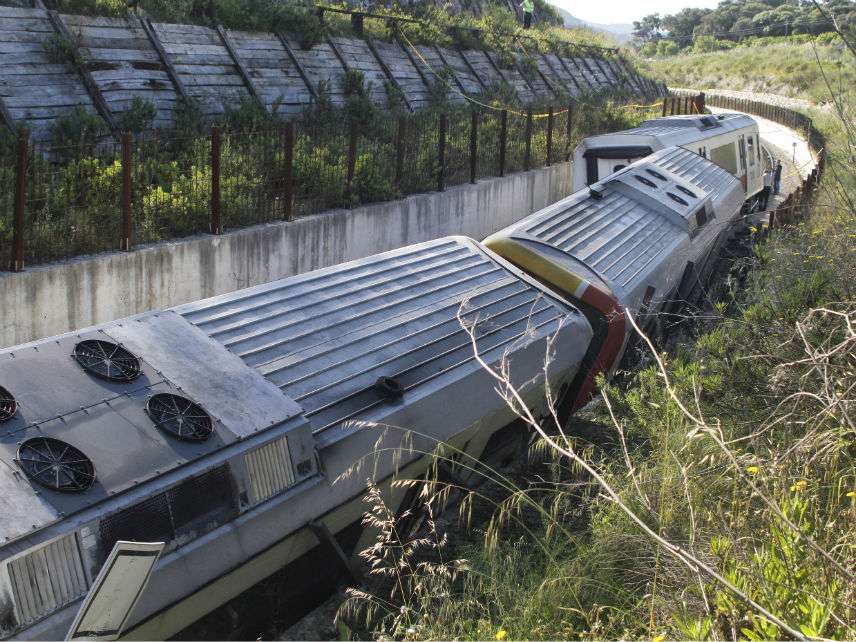Cities Try to Avert 'Transit Apocalypse' With Taxes on Uber, Lyft
Transportation innovation is seeing more people flee outdated public transit.

Mass transit agencies across the country have been having a hell of a time paying for their creaky and often ill-used bus and light rail lines. A couple of cities have come up with a novel solution: tax the transportation services that riders have been using instead.
Yesterday, San Francisco's Transportation Taskforce 2045 produced a proposal to impose a fee of $.20 to $1 per trip on ride-sharing services such as Uber and Lyft. The revenue would be used to shore up the city's Muni bus system and to pay for a bunch of bike lanes and streetscaping projects.
Chicago Mayor Rahm Emmanuel has a similar notion. His 2018 budget includes a $.15 tax on ride-share trips, with the revenue earmarked to fund the Chicago Transit Agency. "We will be the first city to tap the ride-share industry for resources to modernize our transportation system," he told Chicago's city council.
Behind the rhetoric about "modernization" and building transit systems for the future is an attempt to prop up antiquated forms of public transportation that are increasingly irrelevant to today's urban centers.
According to a new study by the Cato Institute's Randal O'Toole, per capita transit ridership has been on a slow but steady decline for the past 50 years. In 1970, the average urban resident took 50 transit trips a year. By 2016, John Q. Citydweller was taking 39, even though politicians directed more than a $1 trillion to the construction and operation of new rail lines, street cars, and fleets of public buses over that period of time.
The raw number of public transit riders has also been in decline over the past three years. Between 2014 to 2016, transit ridership fell 4.4 percent. In the first seven months of 2017, it was down another 3 percent. O'Toole pins this decline on lower gas prices and the rise of ridesharing services. A 2017 survey conducted by researchers at Berkeley found that a third of ride-share users would have taken public transit were Uber and Lyft were not available.
As transit gets squeezed from the outside by cheap and convenient competitors, transit agencies are buckling under the internal pressure of long-deferred maintenance and underfunded pension and health liabilities.
New York's subway system is looking at a $6.3 billion maintenance backlog. D.C.'s WMATA needs to spend $17.4 billion over the next 10 years to fix the maintenance backlog in Washington's Metrorail system. In 2015, the Federal Transit Administration estimated that the transit industry as a whole had a $89.8 billion backlog, a number O'Toole considers "conservative."
Meanwhile, the Chicago Transit Agency has $1.5 billion in unfunded pension obligations—almost as much as its $1.8 billion operating budget. Boston's unfunded pension and health care benefits are double its operating budget of $1.6 billion.
These huge liabilities require agencies to spend an incredible amount of money they don't have on things that will at best prevent transit service from degrading further.
As a fix, O'Toole suggest that transit agencies "stop wasting money on expensive and noncompetitive transit services and focus on providing basic, cost-effective services for those who need transit the most, while putting their economic houses in order by reducing maintenance backlogs, debts, and unfunded obligations." In other words: Stop building new rail lines, and replace the current lines with bus services as they outlive their usefulness.
Instead of grappling with these long-run problems, transit agencies are exacerbating them by building costly light-rail extensions that fail to attract riders. The debt-ridden, fire-prone Washington Metro thought it would fix its problems with the fancy new Silver Line. It didn't, and now the region is building a $2.65 billion Purple Line to service the area's Maryland suburbs.
Seattle's $54 billion transit expansion is expected to net around 30,000 additional daily riders by 2040. That's $1.8 million for each new rider.
These transit expansions are years away from completion, leaving cities with little short-term recourse than to crack down on their competition. Hence the ride-sharing taxes proposed in Chicago and San Francisco. Hence also the onerous regulations and strangely targeted inspections that have befallen San Francisco's only private bus service.
It's a shame. Mobility is crucial both to vitality of urban areas, and to individuals' ability to live richer, fuller lives. Instead of taxing the transportation modes of the future in a vain effort to shore up the transit services of the past, cities should look for ways to embrace ride-sharing, driverless cars, and whatever other innovations are on the horizon.
Rent Free is a weekly newsletter from Christian Britschgi on urbanism and the fight for less regulation, more housing, more property rights, and more freedom in America's cities.


Show Comments (39)